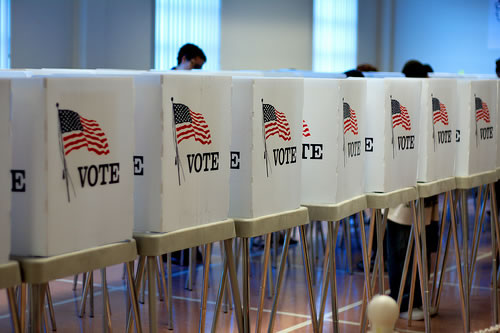For Virgil Goode, Ballot Access Proves Challenging


For former congressman Virgil Goode, ballot access in the upcoming presidential race has been a remarkable challenge. Among the international community, the United States has been criticized for having remarkably difficult ballot access requirements for third party candidates.
An unfortunate side effect of these stringent requirements is that it can be difficult for third party platforms and candidates to gain any traction or public exposure. This is also a result of the "first past the post" voting system and how well it lends itself to two party dominance, but more on that later.
In the United States, each individual state has a specific set of laws with regard to ballot access. That means if a candidate does not have the support of either the Democrats or the Republicans, they have to make the rounds from state to state, proving their public support through independent polls, petitions, and other means in order to even appear on the list of candidates.
To make matters more difficult, the requirements for independent candidates and for less-recognized political parties are more demanding than those for major parties.
An example of the hurdles that third party candidates have to contend with is apparent in both Virginia and Pennsylvania law. In Virginia, members of a minor political party must present the state board of elections a petition of at least 10,000 signatures to be added to the ballot.
Pennsylvania has a similar law in which new political parties or independent candidates must collect signatures equal to 2% of the highest vote getter in the most recent election in the jurisdiction-- no mean feat.
Despite these hurdles, former Congressman Virgil Goode, who is running for president as the Constitution Party nominee, managed to achieve the necessary signatures to appear on the ballot in both of these states. On August first Goode turned in his petition of 35,000 signatures to the Pennsylvania state election authorities, well over the amount that he needed to appear on the ballot.
In Virginia, he managed to gather 20,500 signatures, granting him access to the ballot in November. Common sense would dictate that if a candidate turns in a petition that is deemed sufficient by current law, he or she should appear on the ballot.
But the Republican Party in Pennsylvania has forced Goode off the ballot with legal threats, and in Virginia, it is threatening to do the same by claiming the Constitution Party candidate has committed petition fraud.
Unfortunately, the fear of third party candidates receiving votes that would otherwise go to a Democrat or a Republican is not exactly new, and Republicans are aware of this. It's no coincidence then that Pennsylvania and Virginia are both likely to be battleground states in the upcoming presidential race.
Unsurprisingly, Virgil Goode, who is likely to pull votes from Mitt Romney, is having problems remaining on the ballot in both of these states.
On August 21st, the Constitution Party withdrew its ballot petition in Pennsylvania after it was warned of legal costs by lawyers representing the Republican Party, who promised to legally challenge the third party's petition to gain ballot access. Goode's running mate, James Clymer told the Philadelphia weekly:
"The challenge represented a monolithic establishment party which is intent on denying people the opportunity to vote for anyone who might criticize it from a limited government, non-interventionist perspective. It used its almost limitless resources to take advantage of laws designed by Republicans and Democrats to make sure no other party has a place at the election table and court decisions that have supported raising the hurdles a third party has to jump over to get to a general election."
When reached for comment, Virgil Goode had this to say in regards to the formal complaint lodged by the Republican Party against his bid in Virginia:
"The ballot access in Virginia is not equitable because the Republican Party or anyone who files a FOIA (Freedom of Information Act) request can get a copy of the petitions of all third party and independent candidates, but the petitions of Gov. Romney, Congressman Paul, and others who ran in the primary are in a box with the Chairman of the Republican Party, which, as a private entity, is not subject to the FOIA. That situation should be changed so anyone can FOIA the Republican and Democratic petitions."
So in addition to meeting the higher requirements of running on a third party ticket, these candidates are then put up to even greater scrutiny because any major party can request to vet their petition to be on the ballot. The intent is to challenge smaller candidates, tying them down with legal fees and lengthy litigation in the hopes that they will simply back down from even trying to get on the ballot.
This is exactly what happened in Pennsylvania, according to James Clymer, as a bit of election year strategy on the part of the Republican Party, which is using its overwhelming resources to block ballot access to a candidate who will likely take votes from Mitt Romney in the general election.
It is difficult to find a more clear example of how the two party system and restrictive ballot access laws can be damaging to our democracy. Actions like these limit the efficacy of government, prevent the possible diversity of a ballot that can better represent the American people as a whole, and ultimately, silence the voices of the people who would have voted for Virgil Goode in November.



